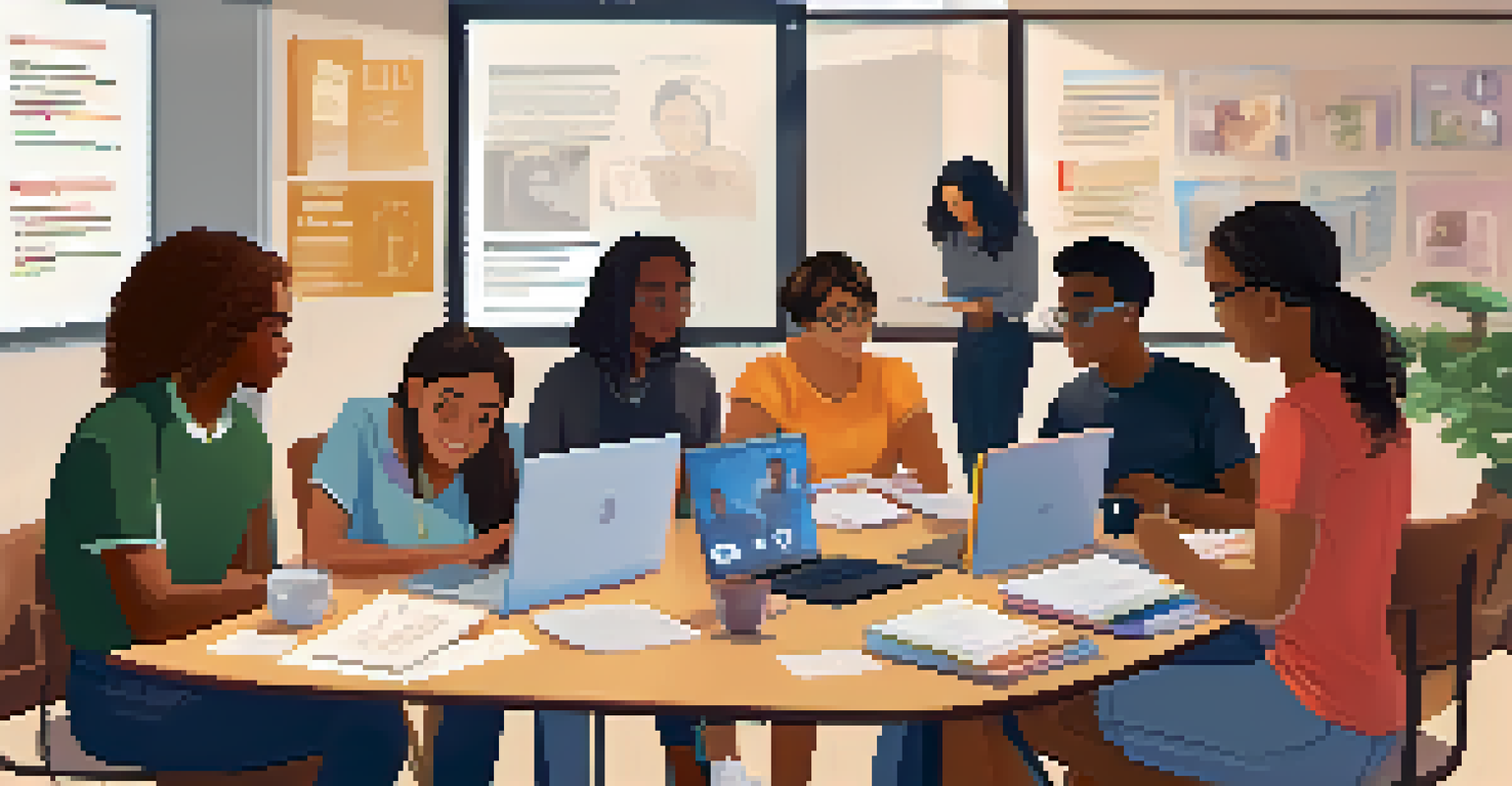Fostering Independence in Remote Learners Through Activities

Understanding the Need for Independence in Remote Learning
In today's digital age, remote learning has become a norm for many students. Independence in learning is crucial, enabling students to take charge of their education. This empowers them to develop critical thinking skills and self-discipline, which are essential for lifelong learning.
The ability to learn independently is one of the most important skills a student can develop.
When learners are independent, they can set their own goals and measure their progress. They learn to navigate challenges without constant assistance, which builds resilience. This independence can also boost their confidence, allowing them to approach problems with a solution-oriented mindset.
Moreover, fostering independence helps prepare students for future academic and professional environments. As they transition to higher education or the workforce, the ability to work autonomously becomes increasingly valuable. Understanding this need is the first step towards implementing effective strategies.
Creating a Structured Learning Environment at Home
A structured learning environment is essential for remote learners to thrive. This structure provides a sense of stability, helping students know what to expect each day. By establishing a consistent schedule, students can develop routines that promote productivity.

For instance, designating a specific area in the house as a 'learning zone' can help signal to students that it’s time to focus. This space should be free from distractions and equipped with the necessary tools for learning. Such an environment not only boosts concentration but also encourages a sense of ownership.
Independence Fuels Learning Growth
Encouraging independence in remote learning empowers students to take charge of their education, enhancing critical thinking and self-discipline.
Additionally, incorporating breaks and downtime in the schedule is vital. Breaks allow the mind to rest and recharge, ultimately enhancing overall learning effectiveness. A balanced approach to structure fosters independence and supports well-being.
Incorporating Goal-Setting Activities for Learners
Goal-setting is a powerful tool that encourages learners to take control of their studies. When students set their own goals, whether academic or personal, they become more engaged in the learning process. It's akin to giving them a map for their journey; they know where they want to go and how to get there.
Education is not the filling of a pail, but the lighting of a fire.
To facilitate this, educators can guide students in creating SMART goals—Specific, Measurable, Achievable, Relevant, and Time-bound. For instance, a student might set a goal to read three books by the end of the month. This provides clear targets and a sense of accomplishment upon completion.
As learners track their progress, they become more accountable for their actions. Celebrating small victories along the way reinforces their motivation and builds their self-esteem. This practice not only promotes independence but also cultivates a growth mindset.
Utilizing Technology to Enhance Independent Learning
Technology is a powerful ally in fostering independence among remote learners. With a plethora of educational tools available, students can explore topics at their own pace. This ability to learn independently gives them the freedom to delve deeper into subjects of interest.
For example, platforms like Khan Academy or Coursera offer a wide range of courses that learners can access anytime. This flexibility allows students to tailor their learning experiences according to their needs. They can choose to revisit challenging concepts or advance to more complex topics as they feel ready.
Structure Supports Learning Success
Creating a structured learning environment at home helps students establish routines that promote productivity and independence.
Furthermore, technology facilitates collaboration among peers. Tools like Google Classroom enable students to work together on projects, fostering a sense of community. This blend of independent and collaborative learning enhances their overall educational experience.
Encouraging Critical Thinking Through Problem-Solving Activities
Critical thinking is a cornerstone of independent learning, and problem-solving activities are an excellent way to develop this skill. When students are faced with challenges, they must analyze information and come up with solutions. This not only enhances their cognitive abilities but also encourages creativity.
Consider incorporating activities like puzzles or real-world scenarios that require students to apply their knowledge. For instance, presenting a math challenge that involves budgeting for a project can make learning practical and engaging. This type of activity encourages them to think critically and independently.
Moreover, discussing the different approaches to problem-solving fosters a deeper understanding of the subject matter. Students learn that there isn't always a single correct answer, and exploring various perspectives enriches their learning experience. This practice cultivates an independent mindset essential for future success.
Fostering Time Management Skills in Learners
Time management is a vital skill that empowers students to manage their learning independently. Teaching them how to prioritize tasks and allocate time effectively can lead to increased productivity. It's like giving them the reins to their own educational journey, allowing them to navigate their schedules with confidence.
One effective method is to encourage the use of planners or digital calendars. By tracking assignments, deadlines, and commitments, students can visualize their workload. This not only helps them stay organized but also instills a sense of responsibility.
Community Enhances Remote Learning
Building a supportive community through virtual study groups fosters collaboration and alleviates feelings of isolation among remote learners.
Additionally, introducing techniques such as the Pomodoro Technique—working in focused bursts followed by short breaks—can enhance concentration. This strategy teaches learners to manage their time wisely while maintaining their energy levels. Ultimately, mastering time management contributes significantly to their independence.
Building a Supportive Community for Remote Learners
While independence is crucial, having a supportive community is equally important for remote learners. A strong network fosters collaboration and encourages students to share experiences and challenges. This sense of belonging can significantly enhance their learning journey.
Creating virtual study groups is an excellent way to build community among learners. These groups provide a platform for students to discuss ideas, seek help, and motivate one another. Engaging with peers can alleviate feelings of isolation and create a sense of camaraderie.

Furthermore, parents and educators can play a pivotal role in this community. Regular check-ins and open lines of communication can help students feel supported as they navigate their learning paths. This balance of independence and support equips them for success in their educational endeavors.